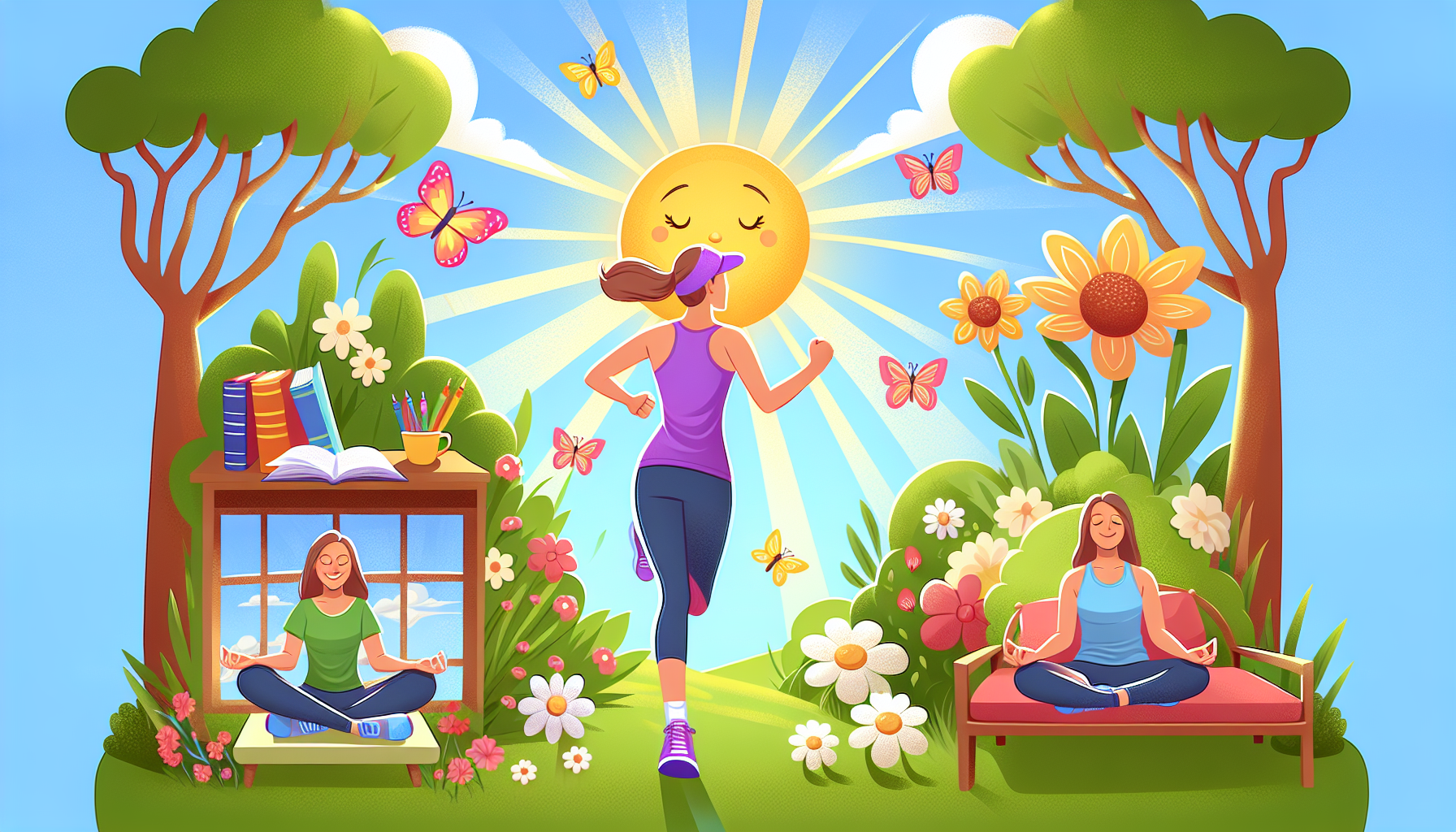Wondering how to work on yourself? This article provides 25 actionable strategies to kickstart your self-improvement journey. Learn new skills, build positive habits, and enhance your mental well-being with practical tips you can start using today.
Key Takeaways
- Embrace continuous learning through online courses, new skills, and language acquisition to enhance personal growth.
- Cultivate positive habits like daily reading, regular exercise, and healthier eating to build a fulfilling life.
- Develop resilience and emotional intelligence by confronting fears, practicing gratitude, and establishing strong personal relationships.
Embrace Continuous Learning

Lifelong learning is a cornerstone of personal growth. Expanding your knowledge and skills opens the door to endless opportunities and self growth for your future self.
New experiences and seeking feedback foster a positive mindset and keep you motivated.
Take Online Courses
Platforms like Udemy, Coursera, and edX offer a plethora of online courses that cater to various interests and skill levels. These courses allow you to learn new skills and expand your knowledge base, significantly contributing to personal development.
Enroll in a course that aligns with your self-improvement goals to start practicing self improvement tips.
Learn a New Language
Learning a new language not only enhances cognitive abilities but also improves cultural understanding. This new skill can boost your patience, perseverance, and even your career prospects, as 56% of employers report an increased need for foreign languages in the workplace.
Begin today and watch your personal growth soar.
Develop a New Skill
Developing new skills is a fundamental aspect of personal development. Whether it’s pottery, Italian cooking, dancing, or even web design, dedicating time to a new hobby can significantly enhance your self-improvement plan. Stretching yourself physically, mentally, or emotionally by learning something new not only boosts self-awareness but also brings joy and satisfaction.
Learning to play a musical instrument can offer a healthy outlet for emotional expression and spark a new passion. Numerous free tutorials on platforms like YouTube can help you begin this new skill.
Cultivate Positive Habits

Positive habits are the building blocks of a fulfilling life. Establishing routines, aiming for small daily wins, and engaging in activities that align with your long-term goals are key to self-improvement. Let’s explore some habits that can significantly enhance your personal growth while also addressing bad habits.
Read Daily
Reading every day is a powerful habit that can lead to immense personal growth. It boosts knowledge and wisdom, crucial for self-improvement.
Whether it’s a personal development article, a book that explores your current interests, or new ideas, reading daily provides continuous learning and enrichment.
Maintain an Exercise Routine
A regular exercise routine is key to physical and mental well-being. Physical activity boosts your immune system, increases energy, regulates hormones and emotions, and enhances focus and motivation.
Join a sport, take daily walks, or use an exercise app to stay motivated and maintain good habits.
Eat Healthier
Eating healthier is a simple yet powerful self-improvement tip. A balanced diet with a variety of colorful foods can significantly boost your energy and overall well-being. Incorporating some improvement tips can further enhance your journey toward a healthier lifestyle.
Improve your eating habits by making small dietary adjustments, such as consuming at least three types of fresh fruits and vegetables every day.
Enhance Mental Well-Being

Enhancing mental well-being is crucial for overall self-improvement. Practices like spending time outdoors, maintaining a balanced diet, and changing media habits can significantly impact your mental and emotional health.
Here are some specific strategies to boost mental well-being.
Practice Meditation
Meditation is a powerful tool for improving self-awareness, anxiety, and depression. It helps you stay focused and practice mindfulness, leading to better mental health and emotional regulation.
Resources like meditation teachers or the Headspace app can help you start meditating and relieve stress.
Start Journaling
Journaling is an excellent way to practice mindfulness and gain emotional clarity. By reflecting on your thoughts and feelings, you can track your progress and understand your personal goals better.
Use tools like The 5-Minute Journal and avoid censoring yourself for true self-reflection.
Limit Social Media Use
Reducing social media use can greatly enhance your mental clarity and well-being. Set specific hours for social media use and use apps that track and limit your usage to stay focused and relieve stress.
Strengthen Emotional Intelligence
Strengthening emotional intelligence is crucial for managing your emotions and improving mental health. Practicing mindfulness and recognizing your emotions are key to developing this vital skill.
Observe Your Emotions
Observing your emotions daily is essential for managing behavior and preventing overwhelming feelings. Staying focused and practicing mindfulness can help you discover insights about your emotions and manage stress effectively.
Express Yourself Creatively
Creative expression is a productive outlet for managing emotions and improving mental well-being. Activities like writing, painting, or music can help you articulate feelings and cope with stress, promoting resilience and emotional intelligence.
Seek Therapy
Seeking therapy can provide valuable insights and support for understanding and managing emotions. Online therapy services offer flexible access to mental health support, aiding in focusing on your self-improvement goals.
Improve Focus and Productivity

Enhancing focus and productivity is crucial for achieving self-improvement goals. Minimizing distractions, setting clear goals, and creating a structured plan help in staying motivated and making progress.
Set Clear Goals
Clear goal-setting is crucial for personal development. Using the SMART framework (Specific, Meaningful, Achievable, Realistic, Trackable) can help you create structured and achievable goals.
Align your goals with your values and create a detailed action plan to maintain motivation and make progress.
Use To-Do Lists
To-do lists effectively aid in task management and focus. Apps like Todoist, Microsoft To Do, and Trello can help you stay organized and prioritize tasks, leading to better time management and reduced stress.
Create a Distraction-Free Environment
A distraction-free environment is essential for improving focus and productivity. Organize your workspace, reduce social media use, and set clear goals to stay focused and relieve stress.
Build Strong Personal Relationships

Strong personal relationships are vital for well-being and personal growth. Meaningful connections offer support, enhance resilience, and contribute to overall happiness.
Invest in Quality Time
Quality time with loved ones is crucial for building strong personal relationships. Simple activities like cooking together or discussing daily experiences can deepen connections and boost overall happiness when you spend time together.
Meet New People
Meeting new people can improve social skills and expose you to diverse perspectives. Joining a local gym class or yoga studio is a great way to connect with others and expand your social circle.
Set Healthy Boundaries
Healthy boundaries are essential for maintaining mental health and well-being in relationships. Saying no and asserting your boundaries can protect your identity and ensure comfort in your interactions.
Develop Resilience and Adaptability
Resilience and adaptability are crucial for navigating life’s challenges and achieving personal growth. Embracing change and viewing failure as a learning opportunity can greatly enhance your self-improvement journey.
Confront Fear of Failure
Confronting the fear of failure is vital for personal growth. View failure as a stepping stone and let go of past grievances to build confidence and resilience.
Practice Gratitude
Regular gratitude practice can shift your mindset towards positivity and resilience. Maintain a gratitude journal, express thanks to others, and reflect on the good things in your life to stay motivated and hopeful.
Embrace Change
Accepting change is vital for personal growth and resilience. Gratitude practice and overcoming fear can help navigate life’s challenges and adapt to new situations.
Summary
To sum up, self-improvement is a continuous journey that involves embracing new learning opportunities, cultivating positive habits, and enhancing mental well-being. By implementing these 25 effective self-improvement strategies, you can achieve your personal development goals and lead a more fulfilling life. Remember, the key to success is staying motivated and committed to your improvement goals.
Frequently Asked Questions
How can I start practicing self-improvement tips effectively?
To effectively practice self-improvement, start by setting clear goals and creating a detailed action plan. Make small, manageable changes and focus on staying consistent to see progress.
What are some good habits to cultivate for self-improvement?
Cultivating habits like daily reading, regular exercise, and mindfulness can significantly enhance your self-improvement journey. Start small, and watch your growth unfold!
How can I improve my mental well-being?
To boost your mental well-being, try incorporating meditation, journaling, and reducing your social media use into your routine. These practices can make a real difference in how you feel.
Why is it important to set healthy boundaries in relationships?
Setting healthy boundaries is essential because it protects your mental health and fosters a more comfortable, respectful relationship. It helps you prioritize your well-being while also enhancing communication and trust.
How can I develop resilience and adaptability?
To develop resilience and adaptability, embrace change, face your fears of failure, and make gratitude a daily habit. These practices can truly strengthen your ability to bounce back and thrive.



